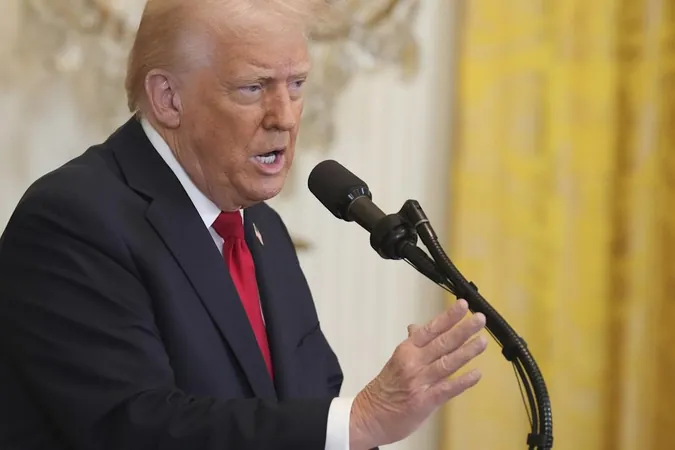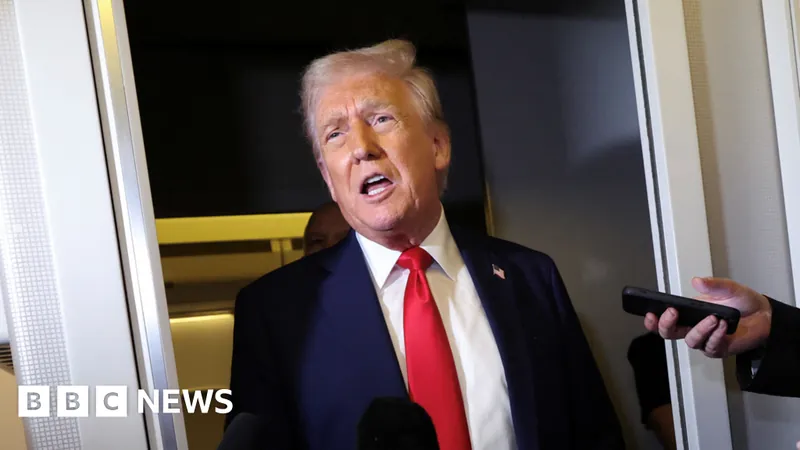
Trump’s Bold 25% Tariff on Auto Imports: Will It Really Raise $100 Billion and Revive American Manufacturing?
2025-03-26
Author: Noah
Introduction
In a daring move that could shake the automotive industry to its core, President Donald Trump announced on Wednesday a monumental 25% tariff on all imported automobiles. According to the White House, this initiative aims to rejuvenate domestic manufacturing, yet it presents a looming crisis for automakers heavily reliant on global supply chains.
Trump's Declaration
“This will propel our growth forward,” Trump declared to reporters. “We’ll effectively be imposing a 25% tariff.”
Revenue Estimates and Implications
The administration estimates that this bold tariff strategy could generate an astounding $100 billion in tax revenue annually. However, the implications for automakers are complex. Even American manufacturers like Ford and General Motors can’t escape the global sourcing web, which could trigger skyrocketing production costs and dwindling sales. Trump asserts that such tariffs will encourage the establishment of new factories on U.S. soil, ultimately dismantling what he labels a 'ridiculous' supply chain that stretches from the United States to Canada and Mexico.
Permanent Decision
To underline the permanence of this decision, Trump ominously stated, 'This is permanent.'
Market Reactions
Following the announcement, the stock market reacted swiftly. Shares of General Motors fell approximately 3%, while Ford’s stock saw a slight increase. However, shares of Stellantis, the parent company of Jeep and Chrysler, plummeted nearly 3.6%.
Challenges for Automakers
Trump has championed the idea of auto tariffs as a central tenet of his presidency, believing these financial burdens could steer production back to American soil and simultaneously reduce the federal budget deficit. Yet, the reality is that both U.S. and international automakers operate globally, with plants designed to meet international sales demands, making it a long and complicated process to establish new manufacturing sites in the U.S.
Expert Concerns
Economist Mary Lovely, a senior fellow at the Peterson Institute for International Economics, expressed grave concerns over the potential consequences. 'We’re looking at significantly higher vehicle prices,' she noted. 'This reduction in the availability of options will disproportionately affect middle and working-class families.' With the average price of a new vehicle already nearing $49,000, this tariff could push many households out of the car market entirely, compelling them to cling to aging vehicles longer than they intended.
Impact on Prices
Starting April 3, the tariffs will begin to be imposed, and if automakers pass on the full costs to consumers, the average price of a car could surge by an alarming $12,500. This not only threatens to exacerbate inflation but also complicates Trump's narrative. After losing the 2020 election, a significant factor was voters' belief that he could control prices.
International Backlash
International backlash came swiftly as global leaders criticized the tariffs. Analysts warn that Trump’s aggressive trade policy might ignite a broader trade war, with the potential to inflict damage on global economic growth.
Conclusion
The question now remains: can America weather the storm of these tariffs, or will they open the floodgates to substantial economic challenges? Stay tuned, as this story continues to unfold!









 Brasil (PT)
Brasil (PT)
 Canada (EN)
Canada (EN)
 Chile (ES)
Chile (ES)
 Česko (CS)
Česko (CS)
 대한민국 (KO)
대한민국 (KO)
 España (ES)
España (ES)
 France (FR)
France (FR)
 Hong Kong (EN)
Hong Kong (EN)
 Italia (IT)
Italia (IT)
 日本 (JA)
日本 (JA)
 Magyarország (HU)
Magyarország (HU)
 Norge (NO)
Norge (NO)
 Polska (PL)
Polska (PL)
 Schweiz (DE)
Schweiz (DE)
 Singapore (EN)
Singapore (EN)
 Sverige (SV)
Sverige (SV)
 Suomi (FI)
Suomi (FI)
 Türkiye (TR)
Türkiye (TR)
 الإمارات العربية المتحدة (AR)
الإمارات العربية المتحدة (AR)